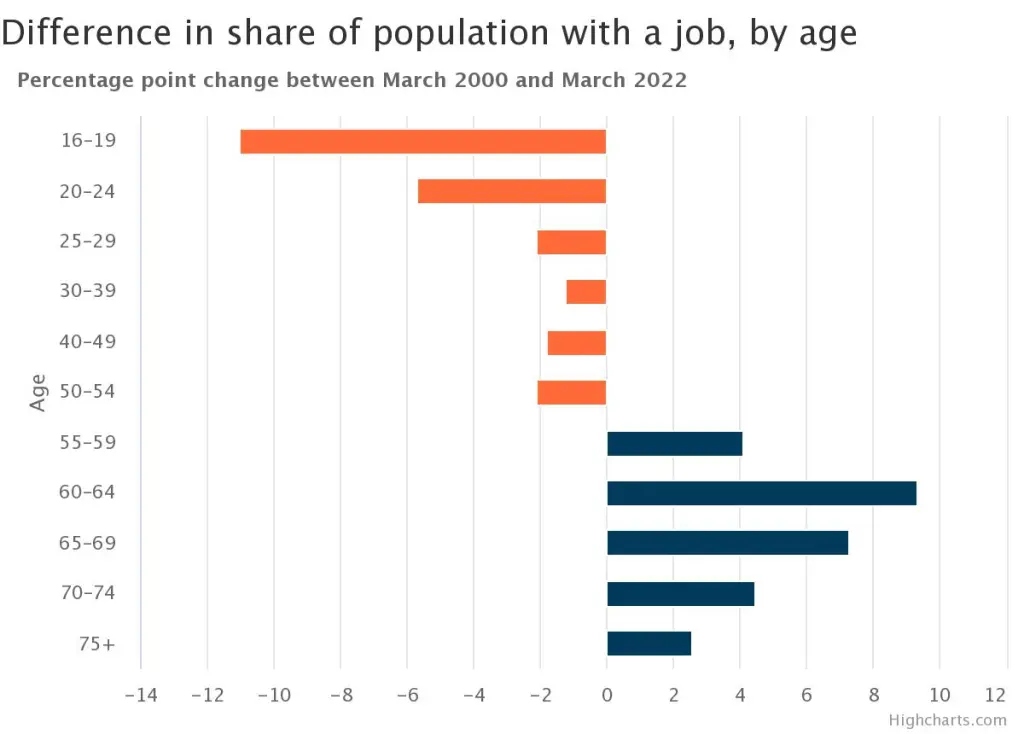Comments
- No comments found

Here’s a figure showing changes in the share of those with jobs, from David H. Montgomery at the Minneapolis Fed, in “Who’s not working? Understanding the U.S.’s aging workforce” (February 27, 2023).
The 16-19 and 20-24 age groups show the biggest decline in share of population from March 2000 to March 2022. Much of this is because of increasing numbers of these age groups are spending more time in school; in addition, they have become less likely to work while in school at either part-time or full-time jobs.
The age groups over 55 all have a rising share with jobs. This shift is in part improved health for older Americans, in part incentives built-in to programs like Social Security to retire later, and a desire (especially among college-educated workers) to bear the tradeoff of later retirement in exchange for saving up a bigger nest egg before retirement.

The mystery is the declining share with jobs among what government statisticians refer as “prime age” workers, between the ages of 25-54. Montgomery doesn’t offer reasons for the decline of job-holding in this group, which are frankly mysterious. This is not a short-run phenomenon relate to the pandemic. It is primarily accounted for by a decline in job-holding among men. The decline in job-holding by prime-age men has been going on for decades, so it seems unlikely that it can be accounted for by a particular law or rule change, or by the political party in power.
The plausible theories suggest that over a period of rising wage inequality, workers who feel stuck at the bottom of the wage distribution may give up on formal work–even if they are in many cases working off-the-books. In addition, the share of adult men who are unpartnered (that is, not married or cohabitating) is high, and single men are increasingly likely to live in the homes of their parents. The disconnectedness of these prime-age adults from the labor force represents a loss of economic production, but surely more important, it represents a substantial group–many of whom have not left the labor force, but instead stuck it out in low-paid jobs–who are living their prime-age years with frustration and resignation relative to their earlier-in-life aspirations.
Timothy Taylor is an American economist. He is managing editor of the Journal of Economic Perspectives, a quarterly academic journal produced at Macalester College and published by the American Economic Association. Taylor received his Bachelor of Arts degree from Haverford College and a master's degree in economics from Stanford University. At Stanford, he was winner of the award for excellent teaching in a large class (more than 30 students) given by the Associated Students of Stanford University. At Minnesota, he was named a Distinguished Lecturer by the Department of Economics and voted Teacher of the Year by the master's degree students at the Hubert H. Humphrey Institute of Public Affairs. Taylor has been a guest speaker for groups of teachers of high school economics, visiting diplomats from eastern Europe, talk-radio shows, and community groups. From 1989 to 1997, Professor Taylor wrote an economics opinion column for the San Jose Mercury-News. He has published multiple lectures on economics through The Teaching Company. With Rudolph Penner and Isabel Sawhill, he is co-author of Updating America's Social Contract (2000), whose first chapter provided an early radical centrist perspective, "An Agenda for the Radical Middle". Taylor is also the author of The Instant Economist: Everything You Need to Know About How the Economy Works, published by the Penguin Group in 2012. The fourth edition of Taylor's Principles of Economics textbook was published by Textbook Media in 2017.
Leave your comments
Post comment as a guest